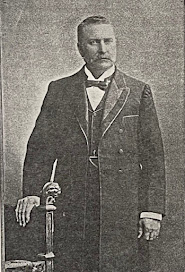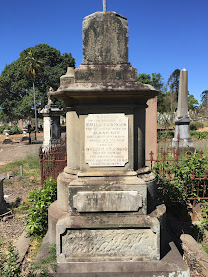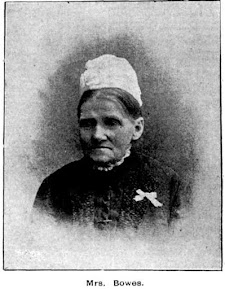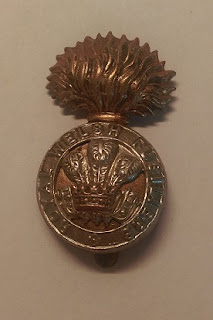Organisation is the key to success!
I was reading recently that the Australian author Kate Grenville has been short-listed for the Women's Prize for her novel about her grandmother, Dolly Maunder. Congratulations Kate! If you don't know about Kate, she is the author of a number of books but I would suggest her best known is "The Secret River" which details the early colonial story of her ancestors on her maternal side and made into a successful TV series.
Many years ago, I had the
occasion to speak with Kate and mentioned that her paternal side of the family was
just as fascinating as her mother’s and as such this week's blog is about her
great grandfather.
ALBAN GEE
Alban was born in Dukinfield,
Cheshire, England in October 1847, the fourth child from eight of Ira and Ann
(nee Wilde). Ira trained as a mechanic at the hands of his father but became
the Manager of the firm of Messrs. John McCall and Co., who owned the largest
meat preserving establishment in England. It was with that firm that Alban
gained his knowledge of the trade.
In 1866, at the age of 19,
he came to Australia under engagement to the Australian Meat Company and two
years later became Sub-Manager of the Melbourne Meat Preserving Company. Five
years later he returned to NSW taking up the position of Manager of the Sydney
Meat Preserving Company, a position he held until his death.
The Sydney Meat Preserving Company
was established in 1869 on land owned by Samuel Haslem and James Wright to aid
in the slaughter and disassembling of livestock. It was located where Haslem's
Creek met Parramatta Road in one corner of a 400-acre site most of which was
used for stockyards. This would be the area where the Reading Cinema site is
today as well as taking in land further south towards Olympic Drive.
Under Alban’s management,
and in no doubt due to his extensive knowledge of meat slaughter and
preservation, the company thrived. In one year alone, 1.25 million sheep and
10,000 bullocks were slaughtered; he also championed early canning
techniques. The company sold its byproducts in both Australia and Asia winning
numerous prizes. It’s successful application of advance technology made it a
leader in food processing in Australia.
Due to the company’s success
other livestock industries were attracted to the area such as butchers and
tanners as well as companies such as Wrights Glue Works and Bennett’s Boot
Factory who had set up operation by 1890.
His employees held him in
high esteem, even though he was considered to be an exacting person requiring the
highest standards but was good to have a “yarn” with and would act on any grievances expressed. The phrase “hard
but fair” comes to mind.
Besides running the company, Alban bred Southdown sheep on his property in
Picton, southwest of Sydney. At times he was the Mayor of Granville and
Lidcombe, Vice-President of the Royal Agricultural Society, a member of the
Zoological Council, President of the Kennel Club and at one state the Deputy
Grandmaster of Freemasons.
He displayed a keen interest in dogs, particularly bulldogs, and at one
time, his bulldog kennels were deemed amongst the best in Australia. He bred a
number of bulldogs and was always in the company of one as he went about his
daily business.
Alban married Emilie Francis Windsor on 21 December 1871 in Melbourne and
together they had eight children. Emilie died young aged 37 on the 2nd of September 1884, a few days after her son, Frank, was born. Alban never
remarried.
Two years before his death, Alban moved to a property in Abbotsford Road,
Homebush, to be closer to his workplace grooming his son, Alban Other, to take
over his Managerial position. He had been in poor health for some time but died
unexpectedly at home on the 21st of April 1917.
Newspaper reports at the time state that over 200 people attended his internment
at the cemetery which was attended by many prominent members of business and
society of Sydney.
The Sydney Meat Preservation Company continued and was taken over by F.J.
Walker Ltd. in 1919 and business boomed. Unfortunately, canned meats ceased to
be productive after WW2 with operations ceasing in 1964 and the works were put
up for sale. The company was formally dissolved in 1972.
Dion Arthur Gee, one of Alban and Emilie’s sons became a prominent Solicitor
and his son, Kenneth Grenville Gee, Kate’s father, became a Judge and
Barrister.
Alban Gee lies in the Anglican section of the Necropolis very close to the
Serpentine Canal with Emilie and their son Walter who died as an infant in
1883.
Alban Gee Monument at Necropolis - author's own collection
His legacy was the industry that surrounded the Homebush area and led to a
burgeoning enterprise and prosperity for the area.
For my references today I have utilised Ancestry.com; Wikipedia, Google,
Trove searches especially the SMH reports on the 23rd and 26th
of April 1917 as well as the book “One life – My mother’s story” by Kate
Grenville.
If you have any insights about the Sydney Meat Preservation Company, perhaps a family member employed there, or other anecdotes please feel free to share them below or in the comments section at the Facebook Group page found under
rookwoodcemeterydiscoveries
Or send me a personal message at
Fingers crossed for success for Kate at the upcoming Women’s Prize award
when it is announced in June for her work "Restless Dolly Maunder".
Until next week.







A very interesting read, love the added pictures..why does this gent seem familiar🤔
ReplyDeleteNot sure ... but I await Kate's deep dive into her paternal line
Delete